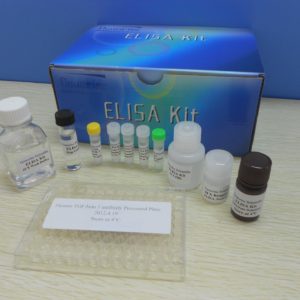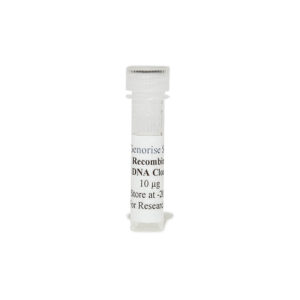Recombinant Human BNP Protein
$99.00 – $2,280.00
The recombinant human BNP protein is derived from in vitro expression of human BNP gene in E. coli and purified using his-tag affinity column and can be used in multiple applications such as cell culture, ELISA and western blot.
Alternative names for BNP: Brain natriuretic peptide
This product is for Laboratory Research Use Only not for diagnostic and therapeutic purposes or any other purposes.
- Description
- Product Citations
- Reviews (0)
Description
Genorise Recombinant Human BNP Protein Summary
Alternative names for BNP: Brain natriuretic peptide
Product Specifications
| Purity | > 97%, by SDSPAGE under reducing conditions and visualized by silver stain. |
| Endotoxin Level | < 0.1 EU per 1 μg of the protein by the LAL method. |
| Activity | na |
| Source | E. coli derived human BNP. |
| Accession # | NP_002512.1 |
| N-Terminal Sequence Analysis | Ser |
| Amino Acid Sequence | Ser103-His134 |
| Predicted Molecular Mass | 4 kDa |
| SDS-PAGE | 4 kDa, reducing conditions |
Background:
Brain natriuretic peptide is a 32-amino acid polypeptide secreted by the ventricles of the heart in response to excessive stretching of cardiomyocytes. BNP is synthesized as a 134-amino acid preprohormone (preproBNP), encoded by the human gene NPPB.[1] Removal of the 25-residue N-terminal signal peptide generates the prohormone, proBNP, which is stored intracellularly as an O-linked glycoprotein; proBNP is subsequently cleaved between arginine-102 and serine-103 by a specific convertase into NT-proBNP and the biologically active 32-amino acid polypeptide BNP-32, which are secreted into the blood in equimolar amounts.[2] The release of BNP is modulated by calcium ions. BNP is secreted attached to a 76–amino acid N-terminal fragment in the prohormone called NT-proBNP (BNPT), which is biologically inactive. Once released, BNP binds to and activates the atrial natriuretic factor receptors NPRA, and to a lesser extent NPRB, in a fashion similar to atrial natriuretic peptide (ANP) but with 10-fold lower affinity. The biological half-life of BNP, however, is twice as long as that of ANP, and that of NT-proBNP is even longer, making these peptides better targets than ANP for diagnostic blood testing. The physiologic actions of BNP are similar to those of ANP and include decrease in systemic vascular resistance and central venous pressure as well as an increase in natriuresis. The net effect of these peptides is a decrease in blood pressure due to the decrease in systemic vascular resistance and, thus, afterload. Additionally, the actions of both BNP and ANP result in a decrease in cardiac output due to an overall decrease in central venous pressure and preload as a result of the reduction in blood volume that follows natriuresis and diuresis. A normal level BNP or NT-proBNP can rule out acute heart failure in the emergency setting. However, an elevated BNP or NT-proBNP should never be used to “rule in” acute or chronic heart failure in the emergency setting due to lack of specificity.[3] BNP and NT-proBNP are also typically increased in patients with left ventricular dysfunction, with or without symptoms (BNP accurately reflects current ventricular status, as its half-life is 20 minutes, as opposed to 1–2 hours for NT-proBNP).[4] Low BNP was found to be a predictor of survival to age 90 in men,[5] and BNP may be a reliable predictor of cardiovascular mortality in diabetics.[18]
References
- Sudoh T, et al. (1989) Biochem. Biophys. Res. Commun. 159 (3), 1427-1434.
- Schellenberger U, et al. (2006). Arch. Biochem. Biophys. 451 (2): 160–6.
- Maisel A, et a. (2002) N Engl J Med. 347 (3): 161–7.
- Atisha D, et al. (2004) Am. Heart J. 148 (3): 518–23.
- Nilsson, G; e tal. (2014) Healthy Aging Research. 3 (5): 1–10.
- Bhalla MA, et al. (2004). J. Am. Coll. Cardiol. 44 (5): 1047–52.
Product Citations
Be the first to review “Recombinant Human BNP Protein”
You must be logged in to post a review.



























Reviews
There are no reviews yet.